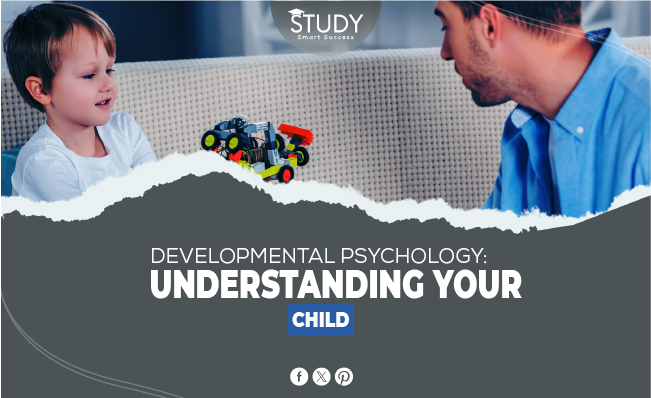As a parent, you’re always trying to understand your child better. Every stage of their growth brings new, fun, and challenging things. Developmental psychology can help parents learn more about their child’s mental, social, and physical growth. This post is meant to help parents understand and support their child’s development by taking the mystery out of developmental psychology.
What is Developmental Psychology?
Developmental psychology studies how and why people evolve. The field now covers adolescence, adulthood, aging, and the entire lifetime, expanding from newborns to children. This discipline studies changes in physical skills, cognitive development, language acquisition, personality, emotions, and social growth.
The Stages of Child Development
Infancy (0-2 years)
Infanthood—from birth to two years—is the initial stage of development. This stage involves fast physical growth, cognitive development, language acquisition, and emotional management. Parents may help their babies grow by creating a secure, sensory-rich environment.
Early Childhood (2-6 years)
This stage involves motor skill development, language learning, and socialization. Children learn via play at this age, so parents must encourage creativity and socialization. Playing with others and teaching them to different activities might help your kid grow throughout these early years.
Middle Childhood (6-12 years)
Middle Childhood is when kids learn about the world and themselves. They increase their language and communication abilities, morals, and identity. Self-esteem and skill development are crucial throughout this time. Encourage your kid to try new things, praise their accomplishments, and promote a good self-image.
Adolescence (12-18 years)
Adolescence involves significant physical, emotional, and social changes. Teens become more independent, have deeper connections, and think abstractly. Identity and values are addressed. Communicating, guiding, and accepting their teens’ developing independence are the most significant ways to help them.
Supporting Your Child’s Development
Understanding developmental psychology can empower parents to support their child’s growth in various ways:
- Create a Nurturing Environment: Ensure your house is secure and supportive so your kids can express themselves. Positive rewards, active listening, and unconditional love build solid connections and emotional stability.
- Encourage Learning and Curiosity: Provide educational toys and literature to foster a love of learning. Answering your child’s inquiries and doing puzzles, games, and experiments will spark their interest.
- Build Strong Relationships: Spend quality time together to build solid family bonds. Family dinners, game evenings, and hobbies help build trust and security.
- Model Positive Behavior: Children learn by watching people, particularly parents. Be compassionate, empathetic, and resilient. Helping kids solve problems may teach them life skills.
- Support Social Interactions: Allow your kid to socialize via playdates, team sports, or social groups. Children learn collaboration, sharing, and communication via social interactions.
- Encourage Physical Activity: Regular exercise is vital for kids’ health and development. Biking, swimming, and tag improve coordination, motor skills, and fitness.
- Provide Emotional Support: Be aware of your child’s emotions. Encourage children to express and validate their feelings. Help children overcome life’s problems by teaching good coping skills and offering emotional support.
By understanding these critical aspects of developmental psychology, parents can be more attuned to their children’s needs and support their overall well-being and growth.
How Developmental Psychology Can Help Parents
Parents can help their kids correctly at the right time by understanding the basic ideas of developmental psychology. You can use developmental psychology in the following ways:
- Tailored Parenting Strategies: If you know what stage of growth your child is in, you can change your parenting style to meet their changing needs.
- Predicting and Understanding Changes: Parents can help their children grow by preparing for the coming changes and giving them the support they need.
- Enhancing Communication: Learning about your child’s cognitive and emotional development helps increase communication and bonding.
- Supporting Educational Success: Developmental psychology may assist parents in helping their kids succeed in school.
- Promoting Independence: Encourage your kid to make age-appropriate choices. This might give them independence and self-confidence.
- Monitoring Milestones: Follow your child’s growth milestones to ensure proper progress. Early intervention may resolve problems.
- Fostering Resilience: Help your youngster handle disappointments. Praise effort above results and emphasize problem-solving to promote a development mentality.
- Ensuring Consistency: Regular routines and regulations provide kids security and predictability. Consistent discipline and expectations teach children limits and self-control.
- Balancing Technology Use: Technology may be helpful for study and enjoyment, but screen time should be balanced with other activities. Give kids plenty of unstructured play and face-to-face time.
- Encouraging Creativity: Allow sketching, constructing, and imaginative play. Through creativity, children may express their ideas and emotions, which develops cognitive and emotional skills.
- Supporting Nutritional Health: A nutritious diet promotes physical and cognitive growth. Teach your kid about good eating and let them help prepare meals.
- Cultivating Empathy: Your youngster should learn to respect others’ emotions and viewpoints. Reading, role-playing, and debating real-life events foster empathy and compassion.
- Maintaining Parental Self-Care: Parents must support physical, mental, and emotional health. Healthy, stress-free parents may help their children grow and model good behavior.
Conclusion
Developmental psychology helps parents understand and support child development. Implementing these suggestions may help children physically, cognitively, emotionally, and socially develop. Remember that every child is different, and understanding their development may make parenting more fun.
Patience, love, and support are essential for understanding developmental psychology. If you must guide your kid through growth, developmental psychology may help.
Please share this article with local parents if it is helpful. Raising the next generation is beautiful, challenging, and fulfilling. Let’s work together.
Parenting is about constantly learning about your kid. Each stage of development offers new difficulties and delights. Developmental psychology helps parents understand their child’s mental, emotional, and physical development. This essay helps parents understand developmental psychology.


